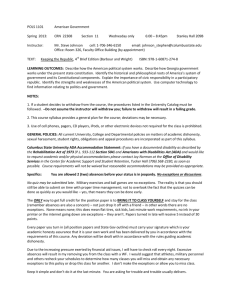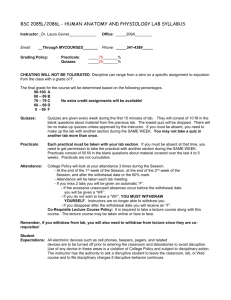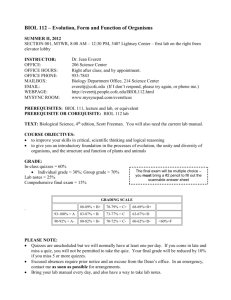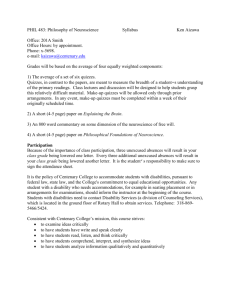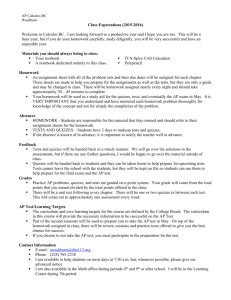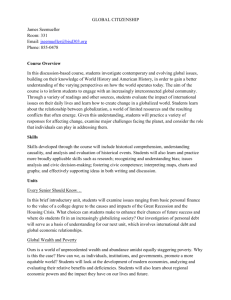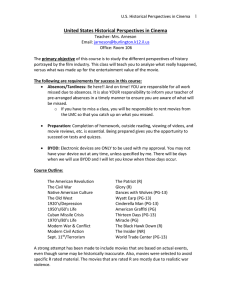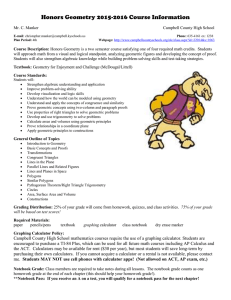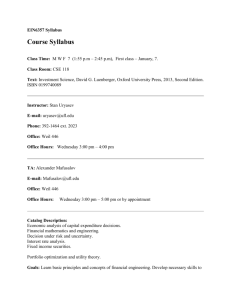Chemistry Lab 123-04 Spring 2009
advertisement
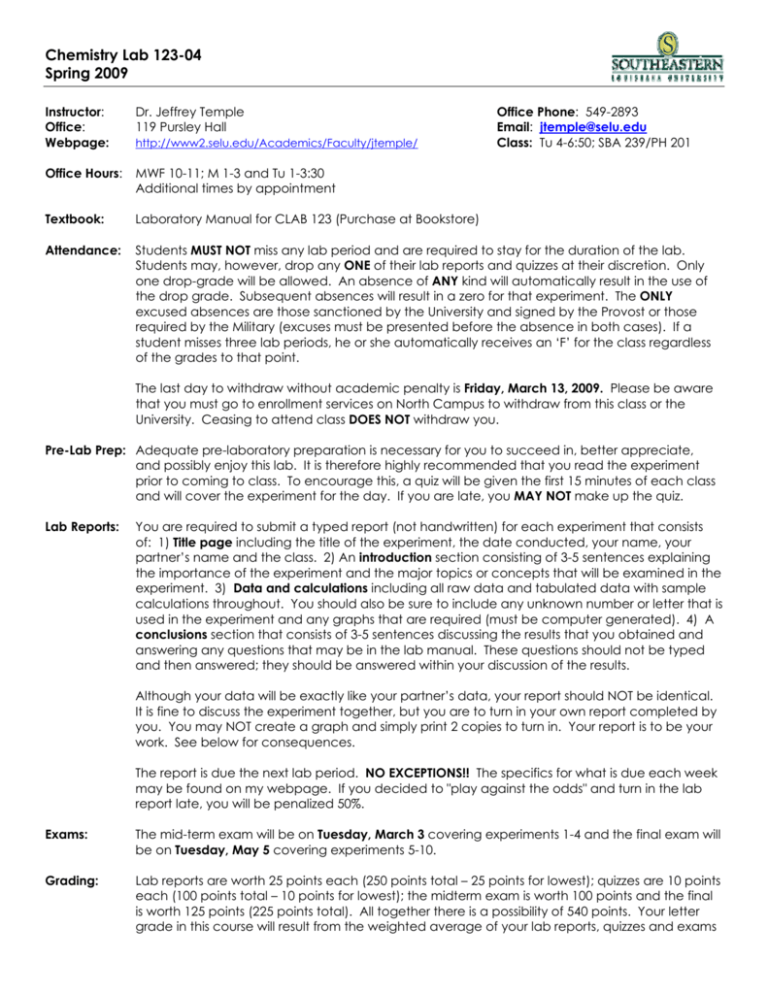
Chemistry Lab 123-04 Spring 2009 Instructor: Office: Webpage: Dr. Jeffrey Temple 119 Pursley Hall http://www2.selu.edu/Academics/Faculty/jtemple/ Office Phone: 549-2893 Email: jtemple@selu.edu Class: Tu 4-6:50; SBA 239/PH 201 Office Hours: MWF 10-11; M 1-3 and Tu 1-3:30 Additional times by appointment Textbook: Laboratory Manual for CLAB 123 (Purchase at Bookstore) Attendance: Students MUST NOT miss any lab period and are required to stay for the duration of the lab. Students may, however, drop any ONE of their lab reports and quizzes at their discretion. Only one drop-grade will be allowed. An absence of ANY kind will automatically result in the use of the drop grade. Subsequent absences will result in a zero for that experiment. The ONLY excused absences are those sanctioned by the University and signed by the Provost or those required by the Military (excuses must be presented before the absence in both cases). If a student misses three lab periods, he or she automatically receives an ‘F’ for the class regardless of the grades to that point. The last day to withdraw without academic penalty is Friday, March 13, 2009. Please be aware that you must go to enrollment services on North Campus to withdraw from this class or the University. Ceasing to attend class DOES NOT withdraw you. Pre-Lab Prep: Adequate pre-laboratory preparation is necessary for you to succeed in, better appreciate, and possibly enjoy this lab. It is therefore highly recommended that you read the experiment prior to coming to class. To encourage this, a quiz will be given the first 15 minutes of each class and will cover the experiment for the day. If you are late, you MAY NOT make up the quiz. Lab Reports: You are required to submit a typed report (not handwritten) for each experiment that consists of: 1) Title page including the title of the experiment, the date conducted, your name, your partner’s name and the class. 2) An introduction section consisting of 3-5 sentences explaining the importance of the experiment and the major topics or concepts that will be examined in the experiment. 3) Data and calculations including all raw data and tabulated data with sample calculations throughout. You should also be sure to include any unknown number or letter that is used in the experiment and any graphs that are required (must be computer generated). 4) A conclusions section that consists of 3-5 sentences discussing the results that you obtained and answering any questions that may be in the lab manual. These questions should not be typed and then answered; they should be answered within your discussion of the results. Although your data will be exactly like your partner’s data, your report should NOT be identical. It is fine to discuss the experiment together, but you are to turn in your own report completed by you. You may NOT create a graph and simply print 2 copies to turn in. Your report is to be your work. See below for consequences. The report is due the next lab period. NO EXCEPTIONS!! The specifics for what is due each week may be found on my webpage. If you decided to "play against the odds" and turn in the lab report late, you will be penalized 50%. Exams: The mid-term exam will be on Tuesday, March 3 covering experiments 1-4 and the final exam will be on Tuesday, May 5 covering experiments 5-10. Grading: Lab reports are worth 25 points each (250 points total – 25 points for lowest); quizzes are 10 points each (100 points total – 10 points for lowest); the midterm exam is worth 100 points and the final is worth 125 points (225 points total). All together there is a possibility of 540 points. Your letter grade in this course will result from the weighted average of your lab reports, quizzes and exams and will correspond to a standard 10-percentage point scale. Violations of safety rules or failing to clean up your station will result in 5 points being deducted from your lab report. Student Behavior: Free discussion, inquiry, and expression are encouraged in the lab. However, classroom behavior that interferes with my ability to conduct the class as I desire or the ability of the students to benefit from instruction is not acceptable. Examples may include routinely entering class late or departing early, USE OF cell phones (talking or texting), talking while others are speaking, or arguing in a manner that may be perceived as “crossing the civility line”. This type of behavior WILL NOT be tolerated and WILL result in the student(s) immediate dismissal from class. There will be ZERO TOLERANCE for inappropriate classroom behavior. Students With “If you are a qualified student with a disability seeking accommodations under the Americans Disabilities: with Disabilities Act, you are required to self-identify with the Office of Student Life, Room 203, Student Union. University Email: Please check your Webmail account daily!! Academic Integrity: “Students are expected to maintain the highest standards of academic integrity. Behavior that violates these standards is not acceptable. Examples are the use of unauthorized material, communication with fellow students during an examination, attempting to benefit from the work of another student and similar behavior that defeats the intent of an examination or other class work. Cheating on examinations, plagiarism, and improper acknowledgment of sources in essays and the use of a single essay or paper in more than one course without permission are considered very serious offenses and shall be grounds for disciplinary action as outlined in the current General Catalogue.” Anyone in violation of the above policies or who has duplicated his or her partner’s laboratory report will receive a grade of ‘0’ for that assignment. A second violation will result in an ‘F’ for the class and the student(s) will be reported to the appropriate University authorities for disciplinary action. Daycare: Please remember that the laboratory is not a place for children, family members or pets not enrolled in the class.
